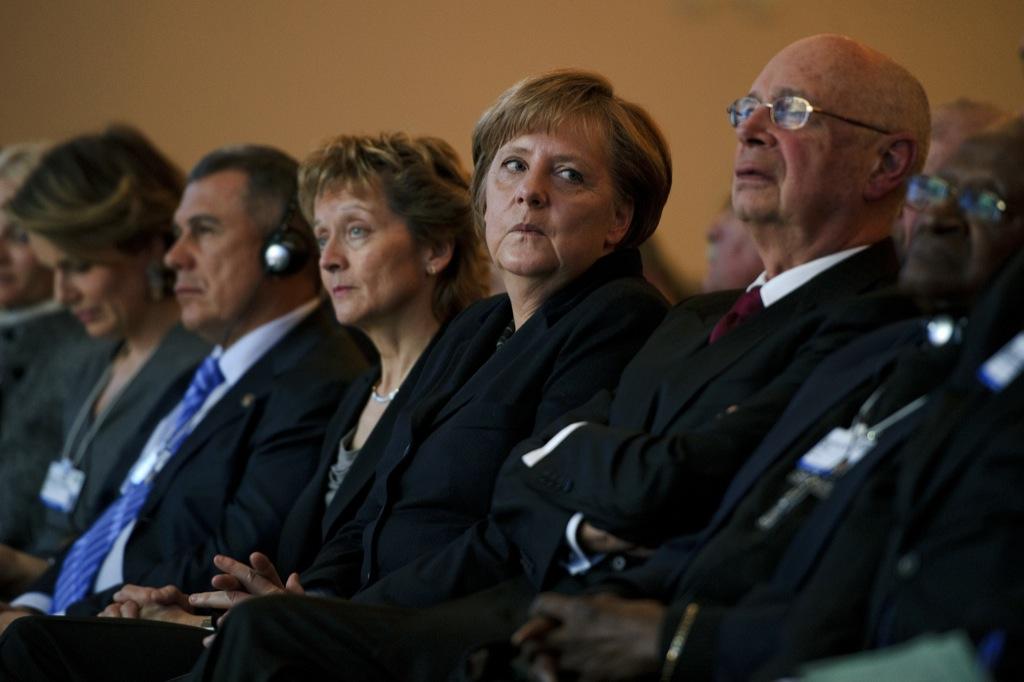Business Insider: A New Watershed Moment In The Euro Crisis?
German Chancellor Angela Merkel (3rd R) sits between Swiss President Eveline Widmer-Schlumpf (3rd L) and World Economic Forum (WEF) founder and executive chairman Klaus Schwab (2nd R), after a speech at the opening session of the World Economic Forum (WEF) annual meeting on Jan. 25, 2012 at the Congress Center in Davos.
Up until now, the private sector has been expected to bear the burden of an imminent Greek debt restructuring by voluntarily accepting losses of 50% or more.
Talk from the International Monetary Fund's Christine Lagarde about public sector involvement, however, suggests that this attitude is quickly changing. If it progresses past Lagarde alone, the realization that the public sector will have to share the burden of revitalizing Greece marks a watershed in EU leaders' crisis response.
Negotiations on the current plan for private sector involvement in the restructuring are stalling in Athens. Even if they agree on a deal that would avoid a credit event (where credit default swap insurance contracts are paid out), it faces serious legal and practical hurdles. Not to mention that the deals currently on the table would not actually return Greece to debt sustainability—and consequently market access—anytime in the near future.
The mere fact that public sector involvement in the debt restructuring is even being discussed marks a watershed in EU leaders' response to the crisis. While the move would entail unwelcome losses for the European Central Bank, it would also affirm EU leaders' willingness to do what's necessary to mitigate the debt problems of the periphery—and prevent them from infecting the larger eurozone.
Absent from the crisis response so far has been a willingness by eurozone countries to mutualize debt burdens on an open-ended scale and start acting like a true monetary union.
While EU countries have all devoted limited funds to keeping Greece afloat, they fall short of offering to pay their fare share for the policies their leaders have established. Greece's EU- and IMF-led bailout to date has done as much to aggravate the country's debt sustainability problems as it has done to mitigate them. By pumping money into an insolvent country, the EU has been able to sustain the skewed balance of trade that has kept countries like Germany in the black.
Greece's public debt grew by €30 billion ($39 billion) from the end of 2009 to the end of 2010, not only deepening its dependence on foreign aid but raising questions about the debt sustainability of other peripheral European countries. Had the EU refused to bail out the struggling country at that time with €110 billion ($142.6 billion) it ultimately agreed on, the ramifications of its default would have been negative, but maybe also limited and relatively contained. Now threats of default are systemic, particularly if EU leaders are looking to fob off most of the burden of this and future debt restructurings on the private sector.
The irony of this situation is that, as FT's Joseph Cotterill points out, the ECB—and as a consequence, the national central banks that fund it—don't have a choice but to accept that the public sector must take losses in a debt restructuring if the private sector can't agree to bear the full burden. Like private banks, the ECB will bear the burden for investing in an insolvent country.
As a drop in the euro suggests this morning, this would also depreciate the value of the currency as ECB funding dissappears into the supply of available euros, likely causing some inflation. (Germans are dead set against this, as any inflation brings back memories of the hyperinflation that occurred in the wake of WWI.)
At the end of the day, Germany has to pay somehow and that's not necessarily a bad thing. The country has profited from export growth funded by the reckless spending of Greece and other peripheral countries. If the ECB were to take losses, Germany's national central bank would take its fair share.
Then again, we can't assume that EU leaders are leaning as strongly towards public sector involvement as Lagarde is (in fact, ECB president Mario Draghi opposes the idea). However, many ideas that EU leaders never would have considered a year ago are now features of policy.
Here's to hoping this issue is the same!
UPDATE: Surprise, surprise. Michael Meister, a senior member of Chancellor Angela Merkel's coalition in Germany, rejected the idea that the ECB take losses in the Greek debt restructuring according to Bloomberg.
"I can't imagine that European politicians would allow third parties to make such an indecent claim on our central bank," Meister said. "That contradicts our philosophy."
While Lagarde's openness to the idea is important, it's clear that the Germans are going to put up a fight here.
Simone Foxman is a reporter for Business Insider's Money Game vertical.
More from our partner Business Insider:
Business Insider: Everything You Need To Know About Hiring Your Own Personal Bodyguard
Business Insider: 14 Major Risks That Used To Be The Stuff Of Science Fiction
Business Insider: The 11 Biggest Food Flops Of All Time
Business Insider: Steve Jobs May Have Been An Arrogant Jerk, But He Wasn't A Narcissist
Business Insider: The BBC's Most Popular TV Host Has Managed To Piss Off 1.2 Billion People
